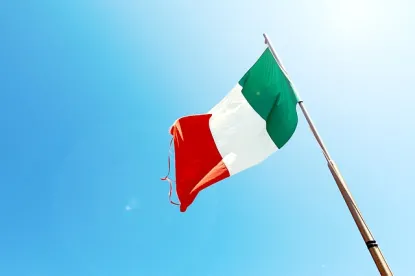The Italian Government recently approved a bill known as the Spazzacorrotti, or “Bribe Destroyer.” The anti-establishment Movimento 5 Stelle, or Five Star Movement, which took office after campaigning to tackle bribery, has been championing the bill as a “revolution in the fight against corruption” that would allegedly save the country billions of euros. However, the same Five Star Movement may well have scored a spectacular own goal, having just become embroiled in a high-profile bribery scandal related to the construction of A.S. Roma’s new football stadium, the 52,500-seat Stadio della Roma, a project that has been beset by difficulty.
The Codice Penale
The Codice Penale, or Italian Code of Criminal Procedure (the Code), contains most of the historic provisions of Italian law that prohibit bribery and corruption.
Specifically, the Code prohibits active and passive bribery related to public officials (that is to say, the conduct of the person offering the money or other advantage or benefit, and the conduct of the corrupted public official receiving the money or other advantage or benefit). The Code also prohibits passive bribery between private parties (that is to say, it criminalizes the violation of duty by a manager, director, or executive in exchange for money or any other advantage or benefit). Anyone found guilty under the bribery and corruption provisions of the Code is punishable by a prison sentence of up to 12 years.
Italian Law in Practice
Though the Code appears strong on paper, the footballing adage reminds us that “games aren’t won or lost on paper.” That maxim appears to hold true with regard to corruption in Italy more generally.
Indeed, it has been estimated that the Italian economy loses up to EUR 236 billion euros a year to corruption. If accurate, that figure equates to approximately 13% of gross domestic product and 150% of the annual public health budget. Moreover, it is 12 times larger than the Italian police force’s funding. Finally, 89% of Italians believe that corruption in Italy is “extremely widespread,” 84% believe it is “part of business culture” in Italy, and 80% think it is so prevalent that it often goes unreported.
As a result, Transparency International consistently regards Italy as one of the most corrupt countries in Europe. On the 2016 Corruption Perceptions Index, Italy took 60th place out of 174 countries, scoring on a par with Cuba. In 2017, Italy came in 54th alongside Mauritius and Slovakia. In 2018, Italy came in 53rd alongside Grenada and Oman. Interestingly, political parties were also ranked the most corrupt institution in Italy, according to Transparency International’s Global Corruption Barometer 2013.
It is therefore little surprise that the Five Star Movement took office on the back of a campaign centered on kicking out corruption.
Spazzacorrotti, Italy’s new “Bribe Destroyer”
Having been approved by Italy’s cabinet, the “Bribe Destroyer” bill is now before parliament and is expected to pass into law. Spazzacorrotti sets out a number of changes to the historic law, including:
-
Extending the definition of foreign public officials to include, e.g., persons performing functions or activities equivalent to those of public officials and employees of international public organizations;
-
Forbidding anyone sentenced to more than two years in prison for bribery and corruption from ever holding public office again;
-
For the first time, permitting undercover agents to work on bribery and corruption investigations; and
-
Worsening the consequences for those convicted of bribery and corruption offences.
Justice Minister and Five Star Movement member Alfonso Bonafede, principal author of Spazzacorrotti, has hailed the bill as a “revolution in the fight against corruption.” However, the Five Star Movement party has subsequently become embroiled in a highly charged scandal regarding the alleged bribery of one of its top officials.
Own Goal
A.S. Roma first presented plans for Stadio della Roma to Rome’s city council in 2014, with an expected completion date of 2016. However, construction has been plagued with delay. Having spent years amassing and analyzing evidence, prosecutors now allege that Five Star Movement member Marcello De Vito, also the president of Rome’s city council, accepted a number of bribes from a local entrepreneur to favor his tender to build the stadium and then to help advance the project.
De Vito was arrested in March 2019, his prosecution is ongoing, and authorities have now suspended construction on the Stadio della Roma project indefinitely.
Additional Considerations
Two more of Italy’s most famous football clubs, A.C. Milan and Inter Milan, recently announced their intention to demolish the iconic San Siro stadium that they share and to replace it with a new structure. It remains to be seen whether Milan’s municipality can avoid the sort of accusations presently levelled at Marcello De Vito.





 />i
/>i
